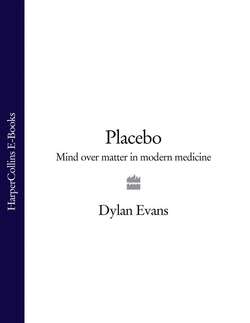Читать книгу Placebo: Mind over Matter in Modern Medicine - Dylan Evans - Страница 14
PLACEBOS AND CANCER
ОглавлениеThe idea that the mind can cure even the most deadly diseases, including cancer, is a popular one. It’s certainly a very comforting idea, but is it true? The evidence is mixed. David Spiegel and his colleagues at Stanford University have found that taking part in group psychotherapy can help women with advanced breast cancer to survive longer, but there were no miraculous cures.18 And the mechanisms which underlie this phenomenon are probably quite different from those involved in the placebo response. Spiegel has argued convincingly that the increase in life expectancy was due mainly to the fact that participating in the group psychotherapy sessions led the women to become involved with each other socially.19 They started to visit each other’s houses, encouraged each other when they had medical problems, and visited each other in hospital. The greater social support in turn encouraged the women to make better use of medical facilities, to co-operate more with doctors, and to make greater effort to look after themselves in general. These behavioural mechanisms are very valuable, but they are a far cry from proving any direct effect of the mind on the healing system.
There is only one case recorded in the medical literature that looks like a case of the placebo response curing cancer. It was reported way back in 1957 by an American psychologist called Bruno Klopfer, and concerns a man whom Klopfer dubbed ‘Mr Wright’.20 Mr Wright had advanced cancer of the lymph nodes (lymphoma), and was expected to die within a few weeks. The various treatments of last resort – radiotherapy and an early chemotherapy agent called nitrogen mustard – could not be used because he was anaemic. While he lay in his bed, awaiting death, Mr Wright heard that a new anti-cancer drug called krebiozen was being tested at the same hospital. He pleaded with his doctor to be given some of the new drug, and his doctor gave him a shot.
Within a few days of the injection, Mr Wright was a changed man. No longer bedridden, he was walking around the ward, chatting happily with the nurses. The huge tumour masses dotted around his body had shrunk from the size of oranges to the size of golf balls. Soon after, he was released from the hospital, apparently free of malignancy.
Two months later the newspapers reported that krebiozen was worthless. Mr Wright’s tumours quickly returned, and he was back in hospital. At this point, his doctor did something that would today be forbidden; he lied to him. Suspecting that the cure had all been down to Mr Wright’s belief in the drug, the doctor told him that the newspapers were wrong, and that krebiozen was turning out to be a powerful remedy for cancer. The only reason for Mr Wright’s relapse, the doctor assured him, was that the dose he had been given came from a batch that had deteriorated somewhat while in the pharmacy. Fortunately for Mr Wright, the doctor went on, a new batch of double-strength krebiozen was due to arrive at the hospital in two days’ time. Two days later, the doctor started giving Mr Wright injections – of pure water.
Again the tumours melted away, and Mr Wright lived for a further two months without symptoms. Then another newspaper report appeared, this time announcing the final verdict of the American Medical Association: nationwide tests really had shown krebiozen to be useless. Again, Mr Wright’s tumours reappeared, and within a few days he was back at the hospital. Two days after his readmission, he was dead.
This story has been repeated many times in the literature on mind-body medicine, but it remains the only one of its kind. This in itself should make us suspicious, since, as we shall see, single cases can be notoriously misleading. True, the timing of the events is very suggestive. Both recoveries happened very shortly after Mr Wright’s beliefs about his prognosis had gone from pessimistic to optimistic, and both relapses occurred within a few days of the reverse change. But coincidences do happen.
To rule out coincidence, we would need to know what would have happened to Mr Wright if he hadn’t been treated and consequently become so optimistic. Would he still have got better anyway? Of course, we will never really know for sure. We can’t go back in time and observe what would have happened if his doctor had never given him the krebiozen or the water injections. We can, however, make an educated guess, based on what tends to happen to people with similar forms of cancer if they are untreated.
There are many forms of cancer, each with its own typical sequence of events. A few, such as lymphoma, are known to fluctuate spontaneously. In a high proportion of cases, the tumours wax and wane without any treatment at all. The fact that Mr Wright was suffering from lymphoma rather than any other form of cancer means that it is quite possible that his two brief remissions from the disease were simply spontaneous fluctuations, unrelated to the krebiozen or the water injections. The fact that the recoveries occurred just after each treatment could easily have been a coincidence. In fact, since no other similar stories have been recorded, this seems the most likely explanation. Despite what some people may say, there is no evidence that the placebo response can cure cancer.
